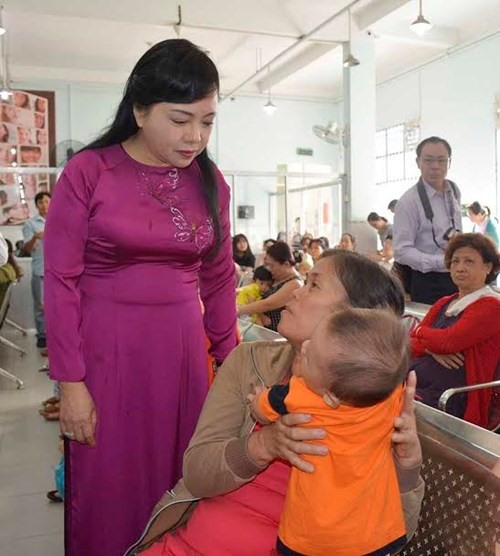 Society
Society

Minister of Health Nguyễn Thị Kim Tiến yesterday instructed the preventive health sector to focus on effective prevention and control of both contagious and non-communicable diseases such as cancers on her working visit to the HCMC Pasteur Institute.
 |
| Health Minister Nguyễn Thị Kim Tiến talks to patients during her working visit to the HCMC Pasteur Institute yesterday.— Photo qdnd.vn |
HCM CITY — Minister of Health Nguyễn Thị Kim Tiến yesterday instructed the preventive health sector to focus on effective prevention and control of both contagious and non-communicable diseases such as cancers on her working visit to the HCMC Pasteur Institute.
On this occasion, the health minister also worked with other institutes the HCM City-based National Institute of Malariology-Parasitology-Entomology, the Municipal Institute of Hygiene and Public Health and the HCMC Preventive Health Centre.
The preventive sector should do more research into ways to reduce outbreaks of emergent contagious diseases and the incidence of cancers, she said.
Saying workers’salaries in the sector are now low, she said the sector should help the Government completely change policies to raise their salaries.
The Minister also said that the ministry yesterday approved proposals for building a centre for bio-medicine and a warehouse to store vaccines at the HCM City Pasteur Institute.
Traditional medicine
A day earlier a Ministry of Health team led by Minister Nguyễn Thị Kim Tiến visited the HCM City Traditional Medicine Institute.
The institute’s head, Huỳnh Nguyễn Lộc, said the ministry should make traditional doctors part of the family doctors development programme it is carrying out to ensure primary healthcare to people.
Members of the Association of Traditional Medicine Practitioners live and work in 322 communes and wards throughout the city.
"If the ministry adopts policies to help them improve their professional skills, they will be useful to the programme in the city," he said.
They would also help prevent diseases more effectively, he said.
“Demand for traditional medical treatment is enormous.”
Tiến approved this suggestion and tasked the city Department of Health to implement it.
Tradition medicine offers great advantages like treatment without drugs for many ailments, using acupuncture instead for conditions like those related to the spine, according to the minister.
"People in the country have great trust in traditional medicine," she said.
Lộc said more and more foreigners came for examination and treatment, but the institute cannot oblige them because it has no permission from the ministry.
He sought the minister’s approval to treat foreigners, saying it would be an advertisement for the country’s traditional medical systems.
The minister again gave approval, even promising support for the institute in this effort.
Her ministry wants to develop traditional medicine, and having a network of traditional medicine facilities throughout the country will help in this.
She instructed the city Department of Health to co-operate with the Association of Traditional Medicine Practitioners and traditional medicine hospitals in the city to train aspiring doctors to improve the quality of medical examination and treatment.
They should begin providing training on demand, she said.
For instance, they could provide training to monks and nuns at pagodas to develop more and more charity healthcare clinics, she said.
“The Traditional Medicine Institute should strengthen research to make popular herbal medicines and sell in the market instead of only at the institute.”
People in the city liked its herbal remedies, she said appreciatively.
To make drugs, it should also focus on finding lands to grow herbs, she said.
Lộc said the city had rehabilitation centres for addicts with large areas of unused lands that could be used for the purpose.
Dr Phạm Vũ Khánh, head of the ministry’s Department of Management of Traditional Medicine, said the institute should take the initiative to contact these centres.
“The institute should study the soil to ensure it is suitable for growing herbs.”
Tiến also suggested that the institute should equip itself with modern equipment like CAT and MRI scanners for effective co-operation with western medicine.
Last year the institute was one of the country’s top 10 hospitals in terms of quality based on the ministry’s criteria.
The number of patients last year increased to 186,000 from 172,000 in 2015. -VNS




